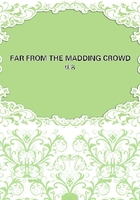
第14章
The Fair - The Journey - The Fire
Two months passed away. We are brought on to a day in February, on which was held the yearly statute or hiring fair in the county-town of Casterbridge.
At one end of the street stood from two to three hundred blithe and hearty labourers waiting upon Chance - all men of the stamp to whom labour suggests nothing worse than a wrestle with gravitation, and pleasure nothing better than a renunciation of the same. Among these, carters and waggoners were distinguished by having a piece of whip-cord twisted round their hats; thatchers wore a fragment of woven straw; shepherds held their sheep-crooks in their hands; and thus the situation required was known to the hirers at a glance.
In the crowd was an athletic young fellow of somewhat superior appearance to the rest - in fact, his superiority was marked enough to lead several ruddy peasants standing by to speak to him inquiringly, as to a farmer, and to use `Sir' as a finishing word. His answer always was,--`I am looking for a place myself - a bailiffs. Do ye know of anybody who wants one?'
Gabriel was paler now. His eyes were more meditative, and his expression was more sad. He had passed through an ordeal of wretchedness which had given him more than it had taken away. He had sunk from his modest elevation as pastoral king into the very slime-pits of Siddim; but there was left to him a dignified calm he had never before known, and that indifference to fate which, though it often makes a villain of a man, is the basis of his sublimity when it does not. And thus the abasement had been exaltation, and the loss gain.
In the morning a regiment of cavalry had left the town, and a sergeant and his party had been beating up for recruits through the four streets.
As the end of the day drew on, and he found himself not hired, Gabriel almost wished that he had joined them, and gone off to serve his country.
Weary of standing in the market-place, and not much minding the kind of work he turned his hand to, he decided to offer himself in some other capacity than that of bailiff.
All the farmers seemed to be wanting shepherds. Sheep-tending was Gabriel's speciality. Turning down an obscure street and entering an obscurer lane, he went up to a smith's shop.
`How long would it take you to make a shepherd's crook?'
`Twenty minutes.'
`How much?'
`Two shillings.'
He sat on a bench and the crook was made, a stem being given him into the bargain.
He then went to a ready-made clothes shop, the owner of which had a large rural connection. As the crook had absorbed most of Gabriel's money, he attempted, and carried out, an exchange of his overcoat for a shepherd's regulation smock-frock.
This transaction having been completed he again hurried off to the centre of the town, and stood on the kerb of the pavement, as a shepherd, crook in hand.
Now that Oak had turned himself into a shepherd it seemed that bailiffs were most in demand. However, No or three farmer noticed him and drew near.
Dialogues followed, more or less in the subjoined form:--`Where do you come from?'
`Norcombe.'
`That's a long way.'
`Fifteen miles.'
`Whose farm were you upon last?'
`My own.'
This reply invariably operated like a rumour of cholera. The inquiring farmer would edge away and shake his head dubiously. Gabriel, like his dog, was too good to be trustworthy, and he never made advance beyond this point.
It is safer to accept any chance that offers itself, and extemporize a procedure to fit it, than to get a good plan matured, and wait for a chance of using it. Gabriel wished he had not nailed up his colours as a shepherd, but had laid himself out for anything in the whole cycle of labour that was required in the fair. It grew dusk. Some merry men were whistling and singing by the corn-exchange. Gabriel's hand, which had lain for some time idle in his smockfrock pocket, touched his flute, which he carried there. Here was an opportunity for putting his dearly bought wisdom into practice.
He drew out his flute and began to play `Jockey to the Fair' in the style of a man who had never known a moment's sorrow. Oak could pipe with Arcadian sweetness,' and the sound of the well-known notes cheered his own heart as well as those of the loungers. He played on with spirit, and in half an hour had earned in pence what was a small fortune to a destitute man.
By making inquiries he learnt that there was another fair at Shottsford the next day.
`How far is Shottsford?'
`Ten miles t'other side of Weatherbury.'
Weatherbury! It was where Bathsheba had gone two months before. This information was like coming from night into noon.
`How far is it to Weatherbury?'
`Five or six miles.'
Bathsheba had probably left Weatherbury long before this time, but the place had enough interest attaching to it to lead Oak to choose Shottsford fair as his next field of inquiry, because it lay in the Weatherbury quarter.
Moreover, the Weatherbury folk were by no means uninteresting intrinsically.
If report spoke truly they were as hardy, merry, thriving, wicked a set as any in the whole county. Oak resolved to sleep at Weatherbury that night on his way to Shottsford, and struck out at once into the high road which had been recommended as the direct route to the village in question.
The road stretched through water-meadows traversed by little brooks, whose quivering surfaces were braided along their centres, and folded into creases at the sides; or, where the flow was more rapid, the stream was pied with spots of white froth, which rode on in undisturbed serenity.